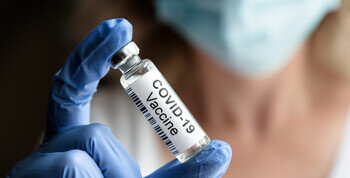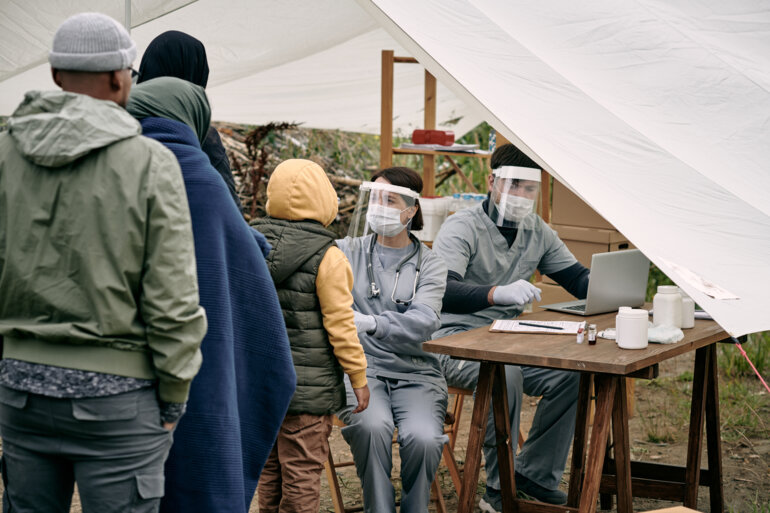At an ESMO Live Roundtable, a panel of experts discussed the benefits and risk of COVID-19 vaccination in patients with cancer, the practicalities of vaccinating those undergoing immunosuppressant treatment and the potential advantages and disadvantages of flexible dosing intervals.
At the Live Roundtable COVID-19 vaccines and cancer care: the known, unknown and the unknowable, held by the European Society for Medical Oncology (ESMO) on Friday 22 January 2021, renowned cancer, vaccine and immunology experts were unanimous in urging government and healthcare providers worldwide to ensure urgent COVID-19 vaccination for patients with cancer and those caring for them.
All patients should be vaccinated, including the frail and elderly, those on chemotherapy, immunotherapy, hormonal therapy or targeted therapy
Prof. Solange Peters, ESMO President, Centre Hospitalier Universitaire Vaudois (CHUV), Lausanne, Switzerland explained that patients with cancer are at higher risk of severe COVID-19 than the general population as reported in registry studies, with mortality ranging from 15% to over 40%. At the same time, the pandemic has also resulted in a higher risk of delivering suboptimal treatment to cancer patients, which may further increase cancer burden.
Since the rapid development of vaccines targeting Sars-CoV-2 to respond to the pandemic emergency, in December 2020 ESMO released ten statements to address the main issues and concerns about the use of these medicines in patients with cancer.
Live vaccines are, in general, contraindicated in patients undergoing immunosuppressive therapy but, as Prof. Thomas Powles, Barts Cancer Institute, London, UK, pointed out, none of the approved COVID-19 vaccines are live vaccines:
“There are a lot of unknowns in this environment, but the very important message is that these vaccines are safe, and the risk-benefit ratio is in favour of vaccination for patients with cancer,” he said. “These patients are a very high-risk population who are having to break lockdown to come for treatment in the middle of the pandemic. We know that we will do no harm in vaccinating them and we hope to give them some immunity against COVID-19 because they are such a vulnerable group.”
Efficacy of COVID-19 vaccination in immunocompromised groups
As immunocompromised patients and those with cancer were excluded from all COVID-19 vaccine trials, there are concerns about the capacity of these groups to mount an effective immune response.
To tackle the need for more data, ESMO recently launched a Call to Action which not only calls for vaccination for all patients with cancer but also for diligent data collection to monitor vaccination effects. All Roundtable panel members supported the need for intensive data gathering to better understand the immune responses of patients with cancer to COVID-19 vaccination.
As Dr. Ravindran Kanesvaran, National Cancer Centre Singapore, Singapore, explained, previous experience with influenza and pneumonia vaccination has shown that patients with cancer respond well to vaccines. “From that data, it is clear that patients who are not under active treatment and cancer survivors are able to mount a good immune response to vaccines”, he said. “However, we do not yet know how people on active immunosuppressive chemotherapy or immunotherapy will respond specifically to the COVID-19 vaccines.”
Prof. Leif Erik Sander, Department of Infectious Diseases and Pulmonary Medicine, Charité -Universitätsmedizin Berlin, Germany, pointed out that the good efficacy data of the COVID-19 vaccine already seen in older people and those with comorbidities may be relevant to patients with cancer.
“The data suggest that the vaccine will work in immunocompromised patients and there is some evidence that even suboptimal immunity can give protection against severe COVID-19 disease, so I would entirely agree that we should vaccinate patients with cancer,” he said.
With new mutated virus variants recently identified in the UK, Brazil, South Africa and other countries, scientists are trying to understand if they will cause more severe disease or
deaths. At the Roundtable, Prof. Uwe Gerd Liebert, Institute of Virology, Leipzig University, Leipzig, Germany, provided reassurance about vaccine efficacy against the mutations that have already been recorded.
“There is no evidence that current vaccines do not cover the mutations we are now seeing. We cannot predict what will happen in the future, but it seems very unlikely that there will be problems with current mutations,” he said. “We do not yet know the duration of protection, especially in cancer patients undergoing immunosuppressive treatment which interferes with T or B cells, and we must closely observe whether these patients lose protection more rapidly against COVID-19 after vaccination.”
The right dose at the right time
A recurrent question during the Q&A session at the end of the event, was about the risk of interactions between the vaccine and antineoplastic treatments such as chemotherapy, targeted therapy, hormonal therapy and immune checkpoint inhibitors. However, in the absence of evidence about such interactions, experts stressed the importance of continuing cancer therapy.
“The message here is to try to deliver treatment optimally because there is no evidence that treatment will increase the risk for patients but there is no doubt that the cancer will increase the risk,” said Peters.
On the question of timing of COVID-19 vaccination in patients undergoing cancer treatment, Powles said that, until there are more data, it would be sensible to leave as much time as possible between dosing with immunosuppressant drugs and vaccination.
“It would make sense to rapidly vaccinate a patient with cancer who is likely to need chemotherapy or immunotherapy in the future so there is as big a gap as possible before they start treatment,” he said. “However, if a patient has already had several cycles of therapy, we may be putting them at risk if we wait to vaccinate them until after they have completed treatment,” he added.
Commenting on concerns over the risk of delaying the second dose of vaccine beyond the initially proposed three to four-week interval, Liebert explained that there was a theoretical possibility that a delayed second dose could increase the risk of viral mutations.
“Delaying the second dose will leave a percentage of the population not fully protected and if these people are infected the virus may come under immune pressure to mutate. This is not proven but, based on our experience with other infections, the risk of mutations may be higher,” he said.
However, Sander pointed out that COVID-19 vaccine trials showed a good response after one dose and suggested that prolonging the dose interval may produce a better immune response. In addition, the very high COVID-19 infection rates in some countries and the limited supplies of vaccine for high risk patients may justify the discussion on delaying the second dose of vaccine.
In her closing remarks, Peters stressed the importance of COVID-19 vaccination not just for patients with cancer but for all those caring for them. “ESMO is an organisation for everyone who cares for patients with cancer and we believe we cannot have a system where people who are giving the vaccine are not vaccinated themselves. They carry the pressure on their shoulders of giving the best possible care to their patients and they can only do that if they are also vaccinated against COVID-19,” she concluded.







